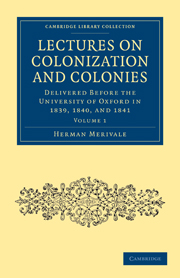 Lectures on Colonization and Colonies
Lectures on Colonization and Colonies Summary
The next subject which requires our attention is not perhaps of much practical importance, but interesting to the scientific inquirer, namely, the effects produced upon the amount and distribution of wealth at home by that export of capital which takes place in colonization. Few families leave the shores of their native country in so destitute a condition as to carry along with them no portion of the accumulated wealth of that country: many are in comparatively easy circumstances, and anxious to realize as much of their property as they can readily turn to account, in order to assist their industry in the new region which they are about to inhabit. This they partly do by carrying away with them valuable articles, more extensively by means of credit, that is, by reserving a title to receive on demand a certain quantity of English produce or its equivalent. A colonist in Canada or New South Wales draws a bill on England for 100l.: England is bound to send out that amount in gold and silver; but gold and silver are only procurable by England through the medium of her own exportable commodities, that is, the produce of her manufactures. The transaction therefore comes in effect to this,—that England has to export, without return, an hundred pounds' worth of her cottons, her hardware, or whatever may be the commodities for which she can command a market. So much capital, therefore, is taken out of the country by the transaction.
- Type
- Chapter
- Information
- Lectures on Colonization and ColoniesDelivered before the University of Oxford in 1839, 1840, and 1841, pp. 162 - 182Publisher: Cambridge University PressPrint publication year: 2010First published in: 1841
